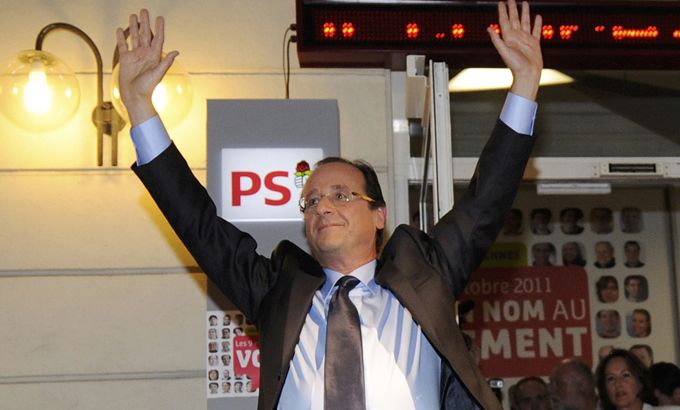Profile: Francois Hollande
France’s president-elect Hollande rides a scooter to work and says he will be a “normal” head of state.

Francois Hollande, the French president-elect, rides a scooter to work and shuns the showbiz style that is the hallmark of Nicolas Sarkozy, the man he unseated.
In a rousing victory speech after taking 51.6 per cent of the May 6 vote, he vowed to unite France.
“To those who haven’t voted for me – let them know that I hear them, and that I will be president to all. There is one France, united in the same destiny,” he said, also pledging to be dedicated to the causes of justice and youth.
Hollande is known as a Socialist party veteran, but has never held a government position and he is relatively unknown outside France.
He profiled himself as a down-to-earth figure on the campaign trail after officially announcing in March 2011 that he would run.
He pledged himself to be a “normal” president, in contrast to the flashy and impulsive style that rapidly earned Sarkozy the name “President Bling-Bling” after he won power in 2007.
‘Solid left’
His supporters praise him as a man who listens and seeks consensus, while his critics accuse him of being soft and wobbly in his leadership style – earning him the nickname “Flanby” after the brand of a caramel pudding.
Hollande is generally viewed as a moderate. “I don’t want a hard left,” said Hollande in a primary debate against Martine Aubry in October 2011.
“We’re just coming out of five years of a brutal presidency. Should we have a divisive candidacy? I don’t want that. We need a solid left.”
Hollande’s policies propose recruiting 60,000 state-employed school teachers if elected in a reversal of staff cuts under Sarkozy, but he has also gone to lengths to say he is no spend-happy leftist but a cautious moderate vowing to reduce France’s public deficit to 3 per cent of the GDP.
To take the party ticket in 2012, he had to prevail in a gruelling primary election that put both his political and private life to the test.
His big break came when Dominique Strauss-Kahn, the former party favourite, was discredited after being arrested in New York in May 2011 for the alleged sexual assault of a maid.
One of the more dramatic moments of that contest came when fellow contender Segolene Royal – his estranged partner of nearly three decades and mother of his four children – publicly endorsed his bid.
Hollande has steadily built up a strong following among party loyalists and paints himself as a modern thinker who is a touch more moderate than some other party grandees.
Throughout his campaign, Hollande has criticised banks and financial markets, promising to tighten control over their activities.
Hollande wants to “restore hope” to France’s youth, notably by subsidising jobs in areas with high youth unemployment.
Passion for politcs
Born on August 12, 1954 in the northwestern city of Rouen into a middle-class family, Hollande told his mother as a child he wanted to be president one day.
He attended France’s prestigious Ecole Nationale d’Administration, the graduate school that churns out most of the country’s political elite.
Having been active in student politics, he joined the Socialist party in 1979 and played a junior role as an economic adviser in the Mitterrand presidency.
A parliamentarian since 1988, he represents a constituency in the south central region of Correze.
He succeeded Lionel Jospin as party leader in 1997, a post he retained for more than a decade.
In 2008, amid acrimony over the defeat of Royal by Sarkozy at the previous year’s presidential election, he stood down.
It later emerged he had been having an affair with journalist Valerie Trierweiler, his current partner.